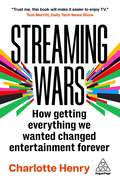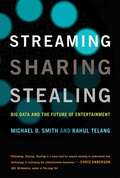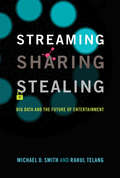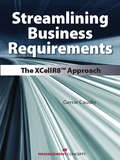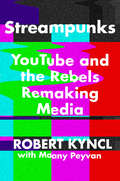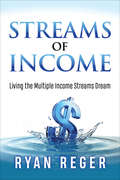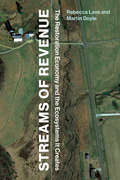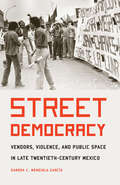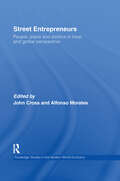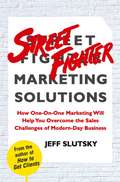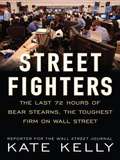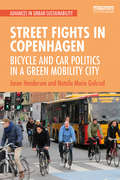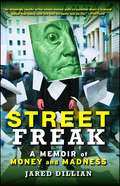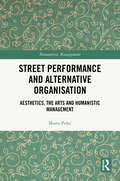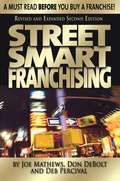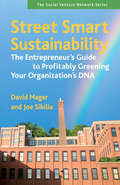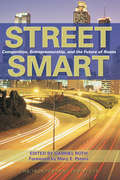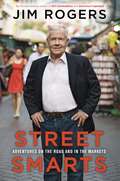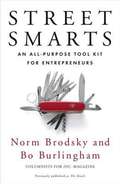- Table View
- List View
Streaming Over Broadband: Why Doesn't My Netflix Work?
by Shane Greenstein Michael NorrisIn late 2013 and early 2014, Netflix service over the major U.S. Internet Service Providers (ISPs) suffered major slowdowns. What were the causes of these problems? What could Netflix do to solve them?
Streaming Over Broadband: Why Doesn't My Netflix Work?
by Shane Greenstein Michael NorrisIn late 2013 and early 2014, Netflix service over the major U.S. Internet Service Providers (ISPs) suffered major slowdowns. What were the causes of these problems? What could Netflix do to solve them?
Streaming Wars: How Getting Everything We Wanted Changed Entertainment Forever
by Charlotte HenryStreaming broadcasters have given consumers all the content they could ever want. But at what cost?In Streaming Wars, journalist Charlotte Henry explores the seismic shifts behind the rise of platforms like Netflix, Disney+, Apple TV+, Spotify, Amazon Prime, Paramount and more. From Hollywood's 2023 strikes to the race for sports rights, the growth of ad-supported tiers and the decline of traditional TV, she reveals how streaming has disrupted not only media economics, but also the power structures that define what gets made and who gets seen.As AI, rebundling and fierce competition drive a new phase in the streaming era, Streaming Wars offers a sharp, accessible look at what's next for companies, creators and audiences alike. Whether you're a casual viewer or a media professional, Streaming Wars is your essential guide to the business battles transforming entertainment.
Streaming, Sharing, Stealing: Big Data and the Future of Entertainment
by Rahul Telang Michael D. SmithTraditional network television programming has always followed the same script: executives approve a pilot, order a trial number of episodes, and broadcast them, expecting viewers to watch a given show on their television sets at the same time every week. But then came Netflix's House of Cards. Netflix gauged the show's potential from data it had gathered about subscribers' preferences, ordered two seasons without seeing a pilot, and uploaded the first thirteen episodes all at once for viewers to watch whenever they wanted on the devices of their choice. In this book, Michael Smith and Rahul Telang, experts on entertainment analytics, show how the success of House of Cards upended the film and TV industries -- and how companies like Amazon and Apple are changing the rules in other entertainment industries, notably publishing and music. We're living through a period of unprecedented technological disruption in the entertainment industries. Just about everything is affected: pricing, production, distribution, piracy. Smith and Telang discuss niche products and the long tail, product differentiation, price discrimination, and incentives for users not to steal content. To survive and succeed, businesses have to adapt rapidly and creatively. Smith and Telang explain how.How can companies discover who their customers are, what they want, and how much they are willing to pay for it? Data. The entertainment industries, must learn to play a little "moneyball." The bottom line: follow the data.
Streaming, Sharing, Stealing: Big Data and the Future of Entertainment
by Rahul Telang Michael D. SmithHow big data is transforming the creative industries, and how those industries can use lessons from Netflix, Amazon, and Apple to fight back. Traditional network television programming has always followed the same script: executives approve a pilot, order a trial number of episodes, and broadcast them, expecting viewers to watch a given show on their television sets at the same time every week. But then came Netflix's House of Cards. Netflix gauged the show's potential from data it had gathered about subscribers' preferences, ordered two seasons without seeing a pilot, and uploaded the first thirteen episodes all at once for viewers to watch whenever they wanted on the devices of their choice. In this book, Michael Smith and Rahul Telang, experts on entertainment analytics, show how the success of House of Cards upended the film and TV industries—and how companies like Amazon and Apple are changing the rules in other entertainment industries, notably publishing and music. We're living through a period of unprecedented technological disruption in the entertainment industries. Just about everything is affected: pricing, production, distribution, piracy. Smith and Telang discuss niche products and the long tail, product differentiation, price discrimination, and incentives for users not to steal content. To survive and succeed, businesses have to adapt rapidly and creatively. Smith and Telang explain how.How can companies discover who their customers are, what they want, and how much they are willing to pay for it? Data. The entertainment industries, must learn to play a little “moneyball.” The bottom line: follow the data.
Streamliner: Raymond Loewy and Image-making in the Age of American Industrial Design
by John WallThe true story of Raymond Loewy, whose designs are still celebrated for their unerring ability to advance American consumer taste.Born in Paris in 1893 and trained as an engineer, Raymond Loewy revolutionized twentieth-century American industrial design. Combining salesmanship and media savvy, he created bright, smooth, and colorful logos for major corporations that included Greyhound, Exxon, and Nabisco. His designs for Studebaker automobiles, Sears Coldspot refrigerators, Lucky Strike cigarette packs, and Pennsylvania Railroad locomotives are iconic. Beyond his timeless designs, Loewy carefully built an international reputation through the assiduous courting of journalists and tastemakers to become the face of both a new profession and a consumer-driven vision of the American dream.In Streamliner, John Wall traces the evolution of an industry through the lens of Loewy’s eclectic life, distinctive work, and invented persona. How, he asks, did Loewy build a business while transforming himself into a national brand a half century before "branding" became relevant? Placing Loewy in context with the emerging consumer culture of the latter half of the twentieth century, Wall explores how his approach to business complemented—or differed from—that of his well-known contemporaries, including industrial designers Henry Dreyfuss, Walter Teague, and Norman Bel Geddes. Wall also reveals how Loewy tailored his lifestyle to cement the image of "designer" in the public imagination, and why the self-promotion that drove Loewy to the top of his profession began to work against him at the end of his career. Streamliner is an important and engaging work on one of the longest-lived careers in industrial design.
Streamlining Business Requirements: The XCellR8 Approach
by Gerrie CaudleEffectively Define and Gather Your Business Requirements Today!Many programming systems today are designed and constructed before business requirements are completed and finalized. Without a proper foundation, these systems will eventually crumble. Streamlining Business Requirements: The XCellR8™ Approach provides project managers and business analysts with the foundation, principles, and steps needed to document business requirements in an accurate and efficient manner. Author Gerrie Caudle introduces the XCellR8™ approach, an analysis method used to gather business requirements in a structured, well-defined set of steps.This book offers comprehensive framework needed to:• Effectively analyze business requirements• Properly identify business events• Prepare for a requirements session• Better understand the "big picture"
Streampunks: YouTube and the Rebels Remaking Media
by Robert Kyncl Maany PeyvanAn entertainment and tech insider—YouTube’s chief business officer—delivers the first detailed account of the rise of YouTube, the creative minds who have capitalized on it to become pop culture stars, and how streaming video is revolutionizing the media world.In the past ten years, the internet video platform YouTube has changed media and entertainment as profoundly as the invention of film, radio, and television did, more than six decades earlier. Streampunks is a firsthand account of this upstart company, examining how it evolved and where it will take us next.Sharing behind-the-scenes stories of YouTube’s most influential stars—Streampunks like Tyler Oakley, Lilly Singh, and Casey Neistat—and the dealmakers brokering the future of entertainment like Scooter Braun and Shane Smith, Robert Kyncl uses his experiences at three of the most innovative media companies, HBO, Netflix, and YouTube, to tell the story of streaming video and this modern pop culture juggernaut. Collaborating with Google speechwriter Maany Peyvan, Kyncl explains how the new rules of entertainment are being written and how and why the media landscape is radically changing, while giving aspiring Streampunks some necessary advice to launch their own new media careers.Kyncl persuasively argues that, despite concerns about technology impoverishing artists or undermining artistic quality, the new media revolution is actually fueling a creative boom and leading to more compelling, diverse, and immersive content. Enlightening, surprising, and thoroughly entertaining, Streampunks is a revelatory ride through the new media rebellion that is reshaping our world.
Streams of Income: Living the Multiple Income Streams Dream
by Ryan RegerStreams of Income is a guide to making the ideal day an everyday occurrence by building multiple streams of income. Multiple streams of income might sound nice, but is it actually possible? YES! Anyone can build a business that creates multiple streams to supplement income or maybe even provides a way to leave their current job. In Streams of Income, online business coach Ryan Reger unpacks the three main online business models and helps readers determine which one is the best fit for them. He also provides the resources readers need to take action and even goes into discovering the “why” for starting an online business. Whether the goal is to spend more time with family, be able to give more to important causes, or saving for kids’ college or retirement, Ryan gives readers the tools they need to reach their goals and live the multiple income streams dream.
Streams of Revenue: The Restoration Economy and the Ecosystems It Creates
by Rebecca Lave Martin DoyleAn analysis of stream mitigation banking and the challenges of implementing market-based approaches to environmental conservation.Market-based approaches to environmental conservation have been increasingly prevalent since the early 1990s. The goal of these markets is to reduce environmental harm not by preventing it, but by pricing it. A housing development on land threaded with streams, for example, can divert them into underground pipes if the developer pays to restore streams elsewhere. But does this increasingly common approach actually improve environmental well-being? In Streams of Revenue, Rebecca Lave and Martin Doyle answer this question by analyzing the history, implementation, and environmental outcomes of one of these markets: stream mitigation banking.
Street Democracy: Vendors, Violence, and Public Space in Late Twentieth-Century Mexico (The Mexican Experience)
by Sandra C. Mendiola GarciaNo visitor to Mexico can fail to recognize the omnipresence of street vendors, selling products ranging from fruits and vegetables to prepared food and clothes. The vendors compose a large part of the informal economy, which altogether represents at least 30 percent of Mexico’s economically active population. Neither taxed nor monitored by the government, the informal sector is the fastest growing economic sector in the world. In Street Democracy Sandra C. Mendiola García explores the political lives and economic significance of this otherwise overlooked population, focusing on the radical street vendors during the 1970s and 1980s in Puebla, Mexico’s fourth-largest city. She shows how the Popular Union of Street Vendors challenged the ruling party’s ability to control unions and local authorities’ power to regulate the use of public space. Since vendors could not strike or stop production like workers in the formal economy, they devised innovative and alternative strategies to protect their right to make a living in public spaces. By examining the political activism and historical relationship of street vendors to the ruling Institutional Revolutionary Party (PRI), Mendiola García offers insights into grassroots organizing, the Mexican Dirty War, and the politics of urban renewal, issues that remain at the core of street vendors’ experience even today.
Street Entrepreneurs: People, Place, & Politics in Local and Global Perspective (Routledge Studies in the Modern World Economy)
by John Cross Alfonso MoralesAddressing the current dearth of available literature on this topic, the editors use a range of international case studies to explore street vending and informal economies which continue to be, especially in developing countries, a vital economic driver. This volume collects essays from authors around the world about the markets and vendors they know best, including studies of USA, China, Mexico, Turkey. The contributors speak of the struggles that vendors have faced to legitimize their activity, the role that they play in helping societies adapt to and survive catastrophes as well as the practical roles that they play in both the local and global social and economic system. As well as highlighting the importance of street markets as a phenomenon of interest in itself to a growing body of scholarship, this study demonstrates how an analysis of street vending can provide insights not only into economic anthropology, but also urban studies, post modernism, spatial geography, political sociology and globalization theory.
Street Fighter Marketing Solutions
by Jeff SlutskyFor any business owner, franchise operator, or marketing executive who seeks to increase sales while lowering marketing costs, Jeff Slutsky offers a new way of thinking. In this indispensable guide to getting more bang for your buck, the well-known marketing consultant tells business managers to think tactically and locally -- using nontraditional, highly targeted forms of marketing and advertising. The tactics, ideas, approaches, and strategies in Street Fighter Marketing Solutions are geared for the bewildering new challenges that confront business- people in the new hypercompetitive, advertising-polluted environment in which they must seek profits. With pressures from "big box" retailers, internet competition, and a glut of other immediate competitors, businessmen and businesswomen need a war chest of proven ideas and strategies to help them thrive. Additionally, local businesses suffer from advertising price increases despite eroding audiences from the local media, especially newspapers, radio, and TV. This book could be the answer to your current and future marketing problems. You'll learn how to mold and manipulate traditional advertising methods while supplementing or supplanting them with alternative, novel techniques for lower cost and higher reward. National and regional corporations who sell their products and services through a network of local retailers, franchisees, or dealers will also benefit greatly from this book. It will provide them with an easy-to-understand blueprint on how to develop, roll out, and maintain a practical, money-saving, sales-generating Street Fighter Marketing program throughout their organization. In a book full of success stories, Slutsky discusses in a clear, practical, straightforward manner how Street Fighter Marketing techniques can work for you. The first step to growing your market share may well be to spend a few hours in the company of one of the nation's most savvy and engaging business tacticians. For more information and a downloadable video, visit www.streetfightermarketing.com.
Street Fighters
by Kate KellyThe acclaimed New York Times bestseller-updated for the second anniversary of the collapse of Bear Stearns The fall of Bear Stearns in March 2008 set off a wave of global financial turmoil that continues to ripple. How could one of the oldest, most resilient firms on Wall Street go so far astray that it had to be sold at a fire sale price? How could the street fighters who ran Bear so aggressively miscalculate so completely? Expanding with fresh detail from her acclaimed front-page series in The Wall Street Journal, Kate Kelly captures every sight, sound, and smell of Bear's three final days. She also shows how Bear's top executives descended into civil war as the mortgage crisis began to brew. .
Street Fights in Copenhagen: Bicycle and Car Politics in a Green Mobility City (Advances in Urban Sustainability)
by Jason Henderson Natalie Marie GulsrudWith 29 percent of all trips made by bicycle, Copenhagen is considered a model of green transport. This book considers the underlying political conditions that enabled cycling to appeal to such a wide range of citizens in Copenhagen and asks how this can be replicated elsewhere. Despite Copenhagen’s global reputation, its success has been a result of a long political struggle and is far from completely secure. Car use in Denmark is increasing, including in Copenhagen's suburbs, and new developments in Copenhagen include more parking for cars. There is a political tension in Copenhagen over the spaces for cycling, the car, and public transit. In considering examples of backlashes and conflicts over street space in Copenhagen, this book argues that the kinds of debates happening in Copenhagen are very similar to the debates regularly occurring in cities throughout the world. This makes Copenhagen more, not less, comparable to many cities around the world, including cities in the United States. This book will appeal to upper-level undergraduates and graduates in urban geography, city planning, transportation, environmental studies, as well as transportation advocates, urban policy-makers, and anyone concerned about climate change and looking to identify paths forward in their own cities and localities.
Street Freak: Money and Madness at Lehman Brothers
by Jared DillianLike Michael Lewis&’s classic Liar&’s Poker, Jared Dillian&’s Street Freak takes us behind the scenes of the legendary Lehman Brothers, exposing its outrageous and often hilarious corporate culture and offering a &“candid look at the demise of a corporate behemoth&” (Publishers Weekly).In the ultracompetitive Ivy League world of Wall Street, Jared Dillian was an outsider as an ex-military, working-class guy in a Men&’s Wearhouse suit. But he was scrappy and determined; in interviews he told potential managers that &“Nobody can work harder than me. Nobody is willing to put in the hours I will put in. I am insane.&” As it turned out, at Lehman Brothers insanity was not an undesirable quality. Dillian rose from green associate, checking IDs at the entrance to the trading floor in the paranoid days following 9/11, to become an integral part of Lehman&’s culture in its final years as the firm&’s head Exchange-Traded Fund (ETF) trader. More than $1 trillion in wealth passed through his hands, yet the extreme highs and lows of the trading floor masked and exacerbated the symptoms of Dillian&’s undiagnosed bipolar and obsessive-compulsive disorders, leading to a downward spiral that nearly ended his life. In his electrifying and fresh voice, Dillian takes readers on a wild ride through madness and back.
Street League Skateboarding
by Christine Snively Robert F. HigginsIn 2013, Street League Skateboarding, a professional skateboarding league founded in 2010, just concluded its annual Street League World Tour. The growing action sports property had purchased time on ESPN2 to air its events, and though ESPN was the most-watched sports television network in the U.S., Street League President Brian Atlas had become impatient with the network's lack of support. Atlas planned to meet with network representatives in the coming months to discuss their 2014 contract, but was recently approached by FOX Sports, which had just launched the new FOX Sports 1 cable television network and was working to sign sports properties. Atlas considered Street League's relationship with ESPN, the league's finances, and attempts to raise capital. For a new action sports property such as Street League, what business model made the most sense?
Street Performance and Alternative Organisation: Aesthetics, the Arts and Humanistic Management (Humanistic Management)
by Marta PołećThe book presents a description of the phenomenon of organising street performances, both informal and within formalised structures, as well as its interpretation from the point of view of humanistic management. The book is a result of ethnographic fieldwork conducted in Polish and European cities from 2014 to 2024.The central focus is the aspects of organisational aesthetics of the activities of street performers and street festival organisers. The dynamics of street performances are structured and emerge as a type of alternative organisation. The book aims at throwing light on these processes from the point of view of humanistic management, which is a relatively new topic in organisational studies and overlooked in other academic fields. The book also identifies and outlines some research implications for the combined area of humanistic management and arts management. It offers a model of the management of street performance embedded in a theoretical context of (1) humanistic management, (2) arts management, and (3) organisation informed by values (such as community and social entrepreneurship). Ultimately, the organisation of art in the urban sphere can gain from lessons from the alternative organisational practices depicted in this book, which, in turn, can inform broader humanistically oriented managerial visions.
Street Smart Franchising
by Joe MathewsExperienced franchisees and franchisors tell entrepreneurs what they need to know before they buy a franchise. Second edition includes a sample copy of the entire UFOC plus 40% new and updated examples. This straight-shooting franchise guide goes beyond the "how to" to teach potential franchisees what to expect when starting a franchise. Real life stories from the trenches illustrate how to cope with the difficulties a franchise presents. The author reveals the personality types most likely to succeed at franchising, and identifies entrepreneurial traits that may increase risk of failure. Plus, it takes an in-depth look at the research and investigation of a franchise, something glossed over in most franchise books.
Street Smart Sustainability: The Entrepreneur's Guide to Profitably Greening Your Organization's DNA (false)
by David Mager Joe SibiliaGo Green While Making Green You already know why your company should go green. This comprehensive guide tells you how to do it profitably. It details every step of the process—from getting employee buy-in and conducting a current sustainability audit to developing a plan of action and measuring progress. Nuts-and-bolts guidance helps you make continuous, cost-effective improvements and shift the prevailing business culture by infusing green practices into your organization’s very DNA. Through illustrative examples from a wide variety of industries, this book shows how to: • Design sustainable products • Green your facilities • Find green vendors • Use renewable energy • Reduce harmful emissions • Recycle waste products, and more The emphasis is on practicality—stand-alone chapters you can read when you need them and tools you can use to implement change in any area of your organization. enough
Street Smart: Competition, Entrepreneurship and the Future of Roads
by Gabriel RothThe poor health of today's roads--a subject close to the hearts of motorists, taxpayers, and government treasurers around the world--has resulted from faulty incentives that misdirect government decision-makers, according to the contributors to Street Smart. During the 1990s, bad government decision-making resulted in the U.S. Interstate Highway System growing by only one seventh the rate of traffic growth. The poor maintenance of existing roads is another concern. In cities around the world, highly political and wasteful government decision-making has led to excessive traffic congestion that has created long commutes, reduced safety, and caused loss of leisure time.Street Smart examines the privatization of roads in theory and in practice. The authors see at least four possible roles for private companies, beyond the well-known one of working under contract to design, build, or maintain governmentally provided roads. These include testing and licensing vehicles and drivers; management of government-owned facilities; franchising; and outright private ownership. Two chapters describe the history of private roads in the United Kingdom and the United States. Contemporary examples are provided of road pricing, privatizing, and contracting out are evident in environs as diverse as Singapore, Southern California, and Scandinavia, and cities as different as Bergen, Norway, and London, England. Finally, several chapters examine strategies for implementing privatization. The principles governing providing scarce resources in free societies are well known. We apply them to such necessities as energy, food, and water so why not to "road space"? The main obstacle to private, or semi-private, ownership of roads is likely to remain the reluctance of the political class to give up a lucrative source of power and influence.Those who want decisions about road services to be controlled by the interplay of consumers and suppliers in free markets, rat
Street Smarts: Adventures on the Road and in the Markets
by Jim RogersWall Street legend and bestselling author Jim Rogers offers investing insights and economic, political, and social analysis, drawing on lessons and observations from his lifetime in the markets. Jim Rogers, whose entertaining accounts of his travels around the world -- studying the markets from Russia to Singapore from the ground up-- has enthralled readers, investors and Wall Street aficionados for two decades in such books as Investment Biker, Adventure Capitalist, Hot Commodities and A Bull In China . In his engaging memoir Street Smarts, Rogers offers pithy commentary from a lifetime of adventure, from his early years growing up a naïve kid in Demopolis, Alabama, to his fledgling career on Wall Street, to his cofounding the wildly successful Quantum Fund.[omit George Soros] Rogers always had a restless curiosity to experience and understand the world around him. In Street Smarts, he takes us through the highlights of his life in the financial markets, from his school days at Yale and Oxford -- where despite the fact that he didn't have enough money to afford the appropriate pair of shoes, he coxed the crew and helped to win the Oxford-Cambridge Boat Race as well as the Thames Cup, the first of his three Guiness World Records,-- to his first heady taste of Wall Street in the mid - 1960s, and his years helping to run the most successful hedge fund on Wall Street. As a result of his extraordinary success with the Quantum Fund, Rogers was able to retire at the age of thirty-seven. Since then he has taught classes in finance at Columbia University, hosted television programs, and traveled the world seeing firsthand how revolutions in Chile affect coffee prices in Seattle, and how shortages of copper in Africa affect electricity brownouts in Ohio. In the course of his new book, Rogers offers often surprising observations on how the world works - and what trends he sees in the future. He explains why Asia will be the dominant economic force in the twenty-first century - and how he and his wife and two daughters moved to Singapore to prepare his family for the coming changes.. He discusses why America and the European Union are in decline, and what we need to do to right our economy and society. The age of Wall Street, Rogers claims, when the finance industry drove 25% of America's growth, is over. Tomorrow's economy will be driven by those who make things - food, energy, goods and consumables. Regarded as one of the most astute investors Wall Street has ever known, Jim Rogers once again is at his acerbic and storytelling best.From the Hardcover edition.
Street Smarts: An All-Purpose Tool Kit for Entrepreneurs
by Bo Burlingham Norm Brodsky"One is tempted to say 'the only book you'll need on starting a business.' Brilliant! Genius! Choose your superlative-it'll fit."-Tom Peters People starting out in business tend to seek step-by-step formulas or rules, but in reality there are no magic bullets. Rather, says veteran company-builder Norm Brodsky, there's a mentality that helps street- smart entrepreneurs solve problems and pursue opportunities as they arise. Brodsky shares his hard-earned wisdom every month in Inc. magazine, in the hugely popular "Street Smarts" column he cowrites with Bo Burlingham. Now they've adapted their best advice into a comprehensive guide for anyone running a small business.
Street Stories: The World of Police Detectives
by Robert JackallDetectives work the streets--an arena of action, vice, lust, greed, aggression, and violence--to gather shards of information about who did what to whom. They also work the cumbersome machinery of the justice system--semi-military police hierarchies with their endless jockeying for prestige, procedure-driven district attorney offices, and backlogged courts--transforming hard-won street knowledge into public narratives of responsibility for crime. Street Stories, based on years of fieldwork with the New York City Police Department and the District Attorney of New York, examines the moral ambiguities of the detectives' world as they shuttle between the streets and a bureaucratic behemoth. In piecing together street stories to solve intriguing puzzles of agency and motive, detectives crisscross the checkerboard of urban life. Their interactions in social strata high and low foster cosmopolitan habits of mind and easy conversational skills. And they become incomparable storytellers. This book brims with the truth-is-stranger-than-fiction violence of the underworld and tells about a justice apparatus that splinters knowledge, reduces life-and-death issues to arcane hair-splitting, and makes rationality a bedfellow of absurdity. Detectives' stories lay bare their occupational consciousness--the cunning and trickery of their investigative craft, their self-images, moral rules-in-use, and judgments about the players in their world--as well as their personal ambitions, sensibilities, resentments, hopes, and fears. When detectives do make cases, they take satisfaction in removing predators from the streets and helping to ensure public safety. But their stories also illuminate dark corners of a troubled social order.
Street Wise: A Guide for Teen Investors
by Janet BamfordThis work explains to teenage investors the successes and investment strategies of real-life teen investors, along with the wisdom of Wall Street pros, and tips on how to make the most of the Web.

